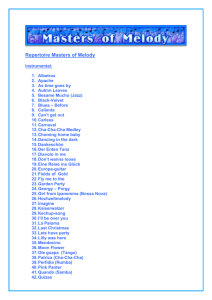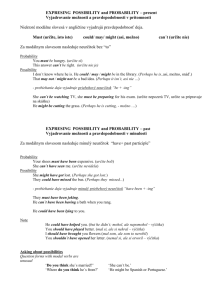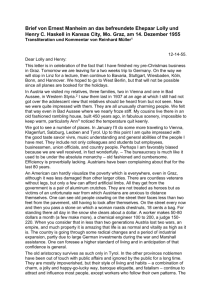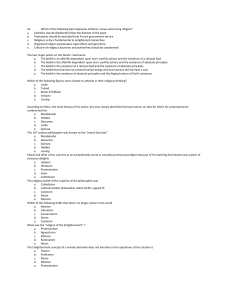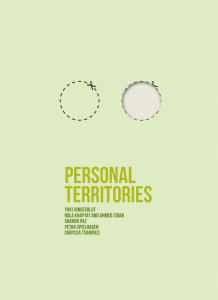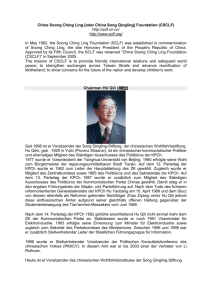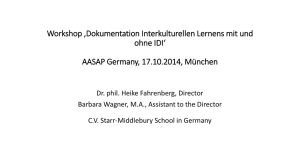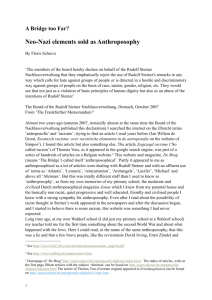Kontrollarbeit zum Thema“Vergleichsformen der Adjectiver”
advertisement
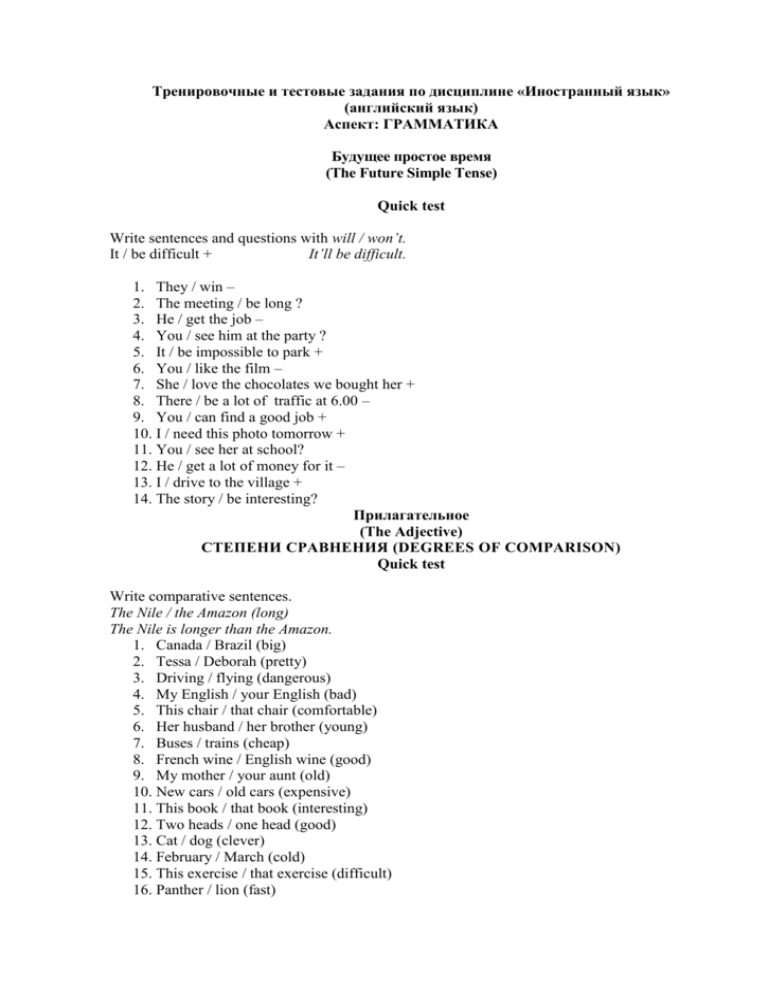
Тренировочные и тестовые задания по дисциплине «Иностранный язык» (английский язык) Аспект: ГРАММАТИКА Будущее простое время (The Future Simple Tense) Quick test Write sentences and questions with will / won’t. It / be difficult + It’ll be difficult. 1. They / win – 2. The meeting / be long ? 3. He / get the job – 4. You / see him at the party ? 5. It / be impossible to park + 6. You / like the film – 7. She / love the chocolates we bought her + 8. There / be a lot of traffic at 6.00 – 9. You / can find a good job + 10. I / need this photo tomorrow + 11. You / see her at school? 12. He / get a lot of money for it – 13. I / drive to the village + 14. The story / be interesting? Прилагательное (The Adjective) СТЕПЕНИ СРАВНЕНИЯ (DEGREES OF COMPARISON) Quick test Write comparative sentences. The Nile / the Amazon (long) The Nile is longer than the Amazon. 1. Canada / Brazil (big) 2. Tessa / Deborah (pretty) 3. Driving / flying (dangerous) 4. My English / your English (bad) 5. This chair / that chair (comfortable) 6. Her husband / her brother (young) 7. Buses / trains (cheap) 8. French wine / English wine (good) 9. My mother / your aunt (old) 10. New cars / old cars (expensive) 11. This book / that book (interesting) 12. Two heads / one head (good) 13. Cat / dog (clever) 14. February / March (cold) 15. This exercise / that exercise (difficult) 16. Panther / lion (fast) Имя существительное (The Noun) Quick test Change the nouns in italics into plural form in the sentences. 1. Put the box on the shelf. 2. I have hurt my foot. 3. Where is the knife? 4. The last leaf fell from the tree. 5. The roof of the house was covered with snow. 6. A copy of the contract was sent to Moscow. 7. I like his new play. 8. Women and children are coming to the shore. 9. The keys to the boxes were lost. 10. The wolves were shot. 11. These factories produce furniture. 12. The mice were caught. 13. Copies of these letters will be sent to New York. 14. These stories are very long. Местоимение (The Pronoun) Quick test Complete the sentences with possessive pronouns. My name is Stephen. 1. Angela, please turn off … mobile phone. 2. The students are from Italy. … names are Susanna and Tito. 3. London is famous for … red buses. 4. She is French, but … mother is English. 5. We are in Class 3. … teacher is Bob. 6. … name is Ian. He is from Scotland. 7. I’m Mike. … family is from Dublin. 8. They are new students. … names are Tina and Daniel. 9. We are an international school. … students are from different countries. 10. What’s … address and postcode ? 11. He is German, but … father is French. 12. 5. … name is Joanna. She is from Wales. 13. 6. He is the director. … name is Michael. 14. It is a school. … name is Queen’s School. Модальные глаголы (Modal Verbs) Quick test Write down the sentences in Past Simple and Future Simple. 1. We can help you. 2. I must wait for him. 3. I can do this work myself. 4. He must be at the Institute at 9 o’clock. 5. They can read English books. 6. She can translate this article into Russian. 7. I must do it at once. 8. I can buy a dictionary for you. 9. You must learn the story by heart. 10. He can go to the library with you. Настоящее продолженное время (The Present Continuous Tense) Quick test Write questions from these words. Use is or are and put the words in order. 1. 2. 3. 4. 5. 6. 7. 8. 9. (working/Paul/today?) (what/doing/the children?) (you/listening/to me?) (where/going/your friends?) (your parents/television/watching?) (what/cooking/Ann?) (why/you/looking/at me?) (coming/the bus?) (who/you/waiting for?) Настоящее простое время (The Present Simple Tense) Quick test Variant I Change the sentences. We like animals. He likes animals. 1. I listen to the radio. 2. He lives in a flat. 3. They have two children. 4. She doesn’t drink coffee. 5. I don’t smoke. 6. The shop closes at 5.00. 7. I go to the pub. 8. I do housework. 9. I go to school every day. 10. She doesn’t like cats. 11. I’m very angry 12. She eats a lot of chocolate. 13. I usually wake up very early. 14. The banks open at 9. 00. 15. We often go to the cinema. 16. They speak loudly. She …………… We …………… He ……………. They …………. My father …….. The shops ……. He ……………. She …………... He ………….. They………… She……….… We …………. My mother…. The bank…… He ………… I …………... Настоящее совершенное время (The Present Perfect Tense) Quick test Complete these sentences. Jill is in hospital. She has been in hospital since Monday. 1. I know Sarah. I …her for a long time. 2. Linda and Frank are married. They … married since 1989. 3. Brian is ill. He … ill for the last few days. 4. We live in Scott Road. We … there for ten years. 5. Catherine works in a bank. She …in a bank for five years. 6. Alan has a headache. He … a headache since he got up this morning. 7. I’m learning English. I … English for six months. 8. Mark is in Canada. He …in Canada since April. 9. Linda is reading the newspaper. She … it for two hours. 10. It’s raining. It … raining all day. Неличные формы глагола (Non-finite forms of the verb) Инфинитив (The Infinitive) Герундий (The Gerund) Quick test Complete the sentences using Gerund or Infinitive. 1. 2. 3. 4. 5. I couldn’t help … . I’m tired of … . He objects to … . She stopped … . He read the newspaper before … . 6. I gave up … . 7. I can’t afford … . 8. He went to the club instead of … . 9. She is very fond of … . 10. He looked at me without … . Структура there is/there are Quick test I. Put in at/on/in. 1. Goodbye! See you … Friday. 2. I got up … 8 o’clock this morning. 3. Where is he? … the kitchen. 4. Don’t sit …the grass. It’s wet. 5. What have you got … your bag? 6. Look! There is a man …the roof. What is he doing? 7. I think I heard the doorbell. There is somebody …the door. II. Put in there is/there isn’t/there are/there aren’t/are there. 1. Kenham isn’t an old town. …any old buildings. 2. 3. 4. 5. Look! …a photograph of your brother in the newspaper. How many students …in the class? – Twenty. Can we take a photo? – No, …a film in the camera. …seven days in a week. Прошедшее простое время (The Past Simple Tense) Quick test Variant I Rewrite the sentences in the past simple with yesterday. I use the Internet. I used the Internet yesterday. 1. I watch TV. ………………. 2. Do you listen to the radio? ………………. 3. We study English. ………………. 4. He doesn’t work. ………………. 5. The film finishes at 7.00. ………………… 6. I don’t like the film. ………………… 7. Does she smoke? ………………… 8. They play tennis. ………………… 9. Today is Monday. ………………….. 10. She doesn’t cook. …………………... 11. Do you play the piano? …………………… 12. We watch TV. ……………………. 13. Kate studies French. …………………….. 14. I go to the swimming-pool. …………………….. 15. The shop closes at 8.00. …………………….. 16. Mary and Kate visit their friends ………………… Прямая и косвенная речь (Direct and Indirect Speech) Quick test Change the direct speech into indirect speech. 1. I said to him, “Please open the door”. 2. She said to me, “Don’t be late!” 3. He asked me, “May I open the window?” 4. Kate asked me, “Why didn’t you come here yesterday?” 5. I said to him, “Send me a telegram when the steamer arrives”. 6. He will say, “I will do it at once”. 7. I said to Anna, “Please don’t be angry!” 8. I asked him, “What will you do if you miss the train?” 9. Frank asked me, “Does he always come so late?” 10. I said to the secretary, “Write to them that we can’t offer the goods”. Страдательный залог (The Passive Voice) Quick test Complete the sentences. Use the passive (present or past) of these verbs: Clean, damage, give, make, take, invite, steal, find, make, show, clean. 1. The room …every day. 2. I saw an accident yesterday. Two people … taken to hospital. 3. Paper … from wood. 4. There was a fire at the hotel last week. Two of the rooms … . 5. “Where did you get this picture?” “It … to me by a friend of mine.” 6. Many American programmes …on British television. 7. “Did Jim and Sue go to the wedding?” “No. They … but they didn’t go.” 8. “How old is this film?” “It … in 1965.” 9. My car …last week but the next day it … by the police. 10. The office … every day. Аспект: ЧТЕНИЕ Установите соответствие между текстами A-E и заголовками 1-9 . Занесите свои ответы в таблицу. Используйте каждую цифру только один раз. В задании один заголовок лишний. 1. Houses which are private are lss safe. 2. Make your possessioons easy to identify. 3. The first time you have your house broken into probably won’t be the last. 4. Burglars look at our houses differently to the Wy we do. 5. Draw attention to your home to make it burglar –proof. 6. Burglars are attracted by sighs of absence. 7. Large homes suggest large bank accounts. 8. Lock up and turn the lights on. 9. Don’t let the outside show what’s inside. A It's the last thing you want to hear when you've just 2n burgled, but the awful truth is that if you've been 'gled once, you'll probably be burgled again. In fact, likely to happen another four or five times. Why? icause some of us have "burglar-friendly" houses. B Burglars think that the bigger the house, the richer the owners. "You can't do much about the size of your "ouse," says Professor Pease of Huddersfield University, "but if it's large, you need to be even more careful than if " s small." C You should take a good look at your house - not as normally do, but as a burglar would. If you were a burglar, which home would you choose to rob, - a house with a shiny new car parked outside or one with a rusty vehicle? Anything which signals nice possessions and money will certainly catch the burglar's eye. D People may complain about their nosy neighbours, out there's no better way of stopping burglars than having watchful neighbours around. If a house is far away from others, or hidden from the road, it is more attractive to burglars, who think they can get in and out without being noticed. So a burglar alarm is a good idea. And remember, you may get privacy from a tall hedge or a high wall - but so does a burglar. E Ian Stephen, who works with the Scottish prison service, believes that you're more at risk if your house looks nice. "Window-boxes, nice curtains and beautifully painted walls all tell the burglar that you're proud of your home and care about your possessions and are more likely to have nice things in your house," he says. He advises people to try to make their homes look as plain as possible and not to draw attention to any new things they have bought by leaving the empty boxes next to the dustbin. F People often leave a light on when they go out. "But be sensible," advises Ian Stephen. "Don't leave a light on in the hall as it never makes the burglars believe that you're in. Have you ever heard of a family enjoying an evening at home in the hall? Leave it on in the living room." An open window is also an open invitation to burglars. If you sometimes forget to shut and lock doors and windows, stick a note on the inside of the front door to remind you. And make sure any ladders are put away and not left outside where burglars can use them. G By leaving newspapers and letters sticking out of the letter-box, or full milk bottles on the doorstep, you are giving burglars the green light to break into your home. Similarly, if you're away from the house at regular times - out at work or doing the shopping - then your home is also in danger of being burgled. Ask a neighbour to keep an eye on your house at these times. H It's a good idea to take photos of your valuable possessions. By doing that, if you're burgled, you'll be able to identify stolen property, which could lead to the thief being put behind bars. It is also possible to label valuable items such as TVs and videos with your postcode. If they are stolen, this will make them easier to find. One more good idea is to ask for a crime prevention officer to visit your home and identify weak points in its security. A B C D E F G H 11 Прочитайте текст и заполните пропуски A-H частями предложений, обозначенными цифрами 1-9. Одна из частей в списке 1-9 лишняя. Занесите цифры, обозначающие части предложений в таблицу. Reduce calories and cut down on sweets, cakes and chocolate. If you are overweight, try to lose weight. Being overweight increases your A ______________of developing circulation problems. Follow a sensible diet - eat as much low-fat food as possible: chicken, fish and yogurt are good for you. Aim to eat at least five portions of fruit and vegetables a day to ensure your B _________________ of Vitamin С and health-giving minerals. Give up smoking - every cigarette shortens your life. Lead an active lifestyle. Keep fit and stay in shape: C _______out in the gym or take up jogging? Choose an activity that you D__________. Exercise should be a pleasure, not a duty. Aim to exercise for about 30 minutes at least five times a week. If you work sitting down, E ___________ up as often as you can and walking around for a while. Don't go to bed late: if you don't get enough sleep, you will lack energy and you will age faster. Sleep replenishes the energies spent during the day and aids the natural healing process of the body. Don't get stressed: F________ and avoid stress at home, school or work. Learn to relax, and when you feel that your stress level is rising, take a break. Don't eat between meals: it's the fastest way to put on weight. If you G ____________snacks, try at least to eat healthy snacks, like fruit or yogurt. Don't be a fitness fanatic! You need to stay in shape but remember to H ___________ . 1. why not work 2. it’s worth practicing 3. keep calm 4. chances 5. can’t give up 6. try getting 7. maintain a balanced diet 8. enjoy doing 9. intake A B C D E F G H Прочитайте текст и выполните задания 12-18. В каждом задании запишите в поле ответа цифру 1,2,3 или 4, соответствующую выбранному Вами варианту ответа. Conservationists have put in years of hard work in central Africa in order to prevent gorillas from becoming completely extinct, but now only 600 mountain gorillas remain on just 285 square miles of land. Three hundred of them inhabit a small crested area on the slopes of the Virunga volcanoes, sur-rounded by villages. The other 300 live twenty miles north in Uganda's forest, which is now a protected area known as Bwindi Impenetrable National Park. This is the total world population of mountain gorillas living in the wild. People tend to view gorillas as fierce, savage animals, so I approached them cautiously. The gorillas soon accepted my presence. If you look into a gorilla's eyes, you see gentleness and intelligence. Unlike the clownish chimpanzee, gorillas are calm and shy. They do play, but sometimes they seem almost embarrassed by their own high spirits. They spend their thirty to forty-year lives mostly in mountain forests, eating thistles and bamboo shoots and sitting thoughtfully. Their patience and gentleness is very attractive to human observers. Yet the mountain gorillas have suffered greatly. Throughout the first quarter of this century, more than fifty gorillas were killed or captured in Virunga; then, in 1925, Carl Akeley of the American Natural History Museum encouraged Belgium to establish Africa's first national park. However, when civil war broke out in 1960, forcing the Belgian park staff to leave, hunters were free to hunt the gorillas. Many were captured so that their heads and hands could be sold to tourists as souvenirs. By 1981 there were only 250 mountain gorillas left. A wildlife conservation society in New York began "gorilla tourism" and an educational programme for the Rwandans. This created greater awareness of gorillas and their endangered habitat. The conservation group trained gorillas so that they were comfortable being observed at close quarters. Tourists paid large amounts to see them, and Rwanda made a profit; it became a 3. model of conservation. Recently, civil war has again threatened the existence of gorillas, and organizations are reinvesting in land protection and tourist schemes. For the first time ever, people and gorillas are dependent on each other for survival. The Rwandans need the money the gorillas attract and gorillas desperately need protection. Farmland has been taken by the state and the farmers removed from their land; despite this, there is a real love for the gorillas. I remember what Nshogoza, my guide, said: When I was a boy, I heard that gorillas were men who were very bad and who went to live in the forest; but gorillas are better than us. They are peaceful. They have no tribes. When they fight they have a good reason. We fight for nothing." In a sense, Nshogoza is right. 12 According to the text, mountain gorillas 1. 2. 3. 4. have completely died out. now number between 285 and 600. now number only 300. live in only two areas in the wild. Ответ: 13 The author was under the impression that gorillas 1. 2. 3. 4. were fiercer than chimpanzees. were afraid of chimpanzees. were aggressive. could show no emotions. Ответ: 14 CarlAkeley 1. 2. 3. 4. made Africa establish a zoo. captured gorillas in a national park. built a zoo in Belgium. helped to protect the gorillas. Ответ: 15 Between 1960 and 1981, 1. 2. 3. 4. many gorillas were killed. there was a war between the hunters and the Belgians. there was a war between Belgium and Uganda. 250 gorillas disappeared. Ответ: 16 The wildlife conservation society in New York 1. sold gorillas as souvenirs to tourists. 2. arranged cheap holidays in Rwanda. 3. encouraged people to go and see the mountain gorillas. 4. trained gorillas to observe people. Ответ: 17 What does "it" in line 34 refer to? 1. 2. 3. 4. the gorillas' habitat Rwanda the war money made Ответ: 18 Why do the Rwandans depend on the gorillas? 1. 2. 3. 4. Because people need to be safe. Because gorillas are peaceful. Because of economic reasons. Because gorillas are threatened with extinction. Аспект: ПИСЬМО You have received a letter from your English-speaking pen friend Jane who writes … At university we are doing projects connected with the system of education in other countries. Could you tell me if you discuss any educational problems with your classmates and teachers? As for the family news my sister got married last week… Write a letter to Jane. In your letter answer her question ask 3 questions about her educational projects Write 100 – 140 words. Remember the rules of letter writing. (немецкий язык) Аспект: ГРАММАТИКА Kontrollarbeit zum Thema “Modalverben” Aufgabe 1.Wählen Sie das richtige Modalverb 1) An der Hochschule ….. man direkt oder fern studieren. mögen 2) Unsere Gruppe …. am Ende dieses Semesters vier Prüfungen ablegen. wollen 3) …… ich Ihnen heute abend anrufen? können 4) Mein Freund …. den Gemüsesalat in unserer Mensa besonders gern. müssen 5) Nach der Absolvierung der Uni …… meine Schwester als Schulpsychologe arbeiten. dürfen 6) Jeder …. die Lehrbücher in der Bibliothek nehmen. sollen Aufgabe 2. Stellen Sie 4 Fragen zu diesem Satz. Er will nach der Absolvierung der Universität in der Anfangschule verschiedene Fächer unterrichten. Aufgabe 3. Übersetzen Sie auf deutsch 1) Я хотел бы рассказать о нашем университете. 2) В нашем вузе могут учиться 6000 студентов. 3) Многие студенты могут жить в общежитие или снимать квартиру. 4) На первом курсе мы должны сдать 5 зачетов и 3 экзамена. 5) В читальном зале мы можем (нам разрешается) работать до 18 часов. 6) После занятий нам часто хочется пройтись пешком. Kontrollarbeit zum Thema “Nebensätze” I. Verwandeln Sie die eingeklammerten Sätzte. Übersetzen Sie diesen Nebensätze. Muster: Versprich mir, (du vergißt meine Bitte nicht).- Versprich mir, daß du meine Bitte nicht vergißt. (Пообещай мне, что ты не забудешь мою просьбу) 1. Er hat mich gefragt, (ich interessiere mich für Malerei). 2. Ich bin der Meinung, (in den Ferien kann man Geld verdienen). 3. Mein Freund, (ich habe in Mathe geholfen), legt bald seine Prüfungen ab. 4. (Wir kamen gestern nach Hause), waren alle sehr müde. 5. Heute gehen die Studenten in den Lesesaal, (sie müssen sich zur Vorlesung vorbereiten). 6. Petersburg, (im 1703 wurde von Peter dem Ersten gegründet), ist jetzt die zweitgrößte Stadt Rußlands. 7. (Das Wetter war schlecht), gingen sie nicht spazieren. 8. Er spricht langsam, (keine Fehler machen). 9. Je später du nach Hause kommst, (du hast wenig Zeit für die Vorbereitung auf die Kontrollarbeit) 10. Ich fuhr zu meinen Eltern, (ich hatte alle Prüfungen an der Hochschule bestanden). Kontrollarbeit zum Thema Steigerungsstufen der Adjektive Aufgabe 1. Setzen Sie die Adjektive im Komparativ oder Superlativ ein: 1. Der Herbst ist (kalt) … als der Sommer. 2. Die Lomonossow – Universität ist die (alt) … in Russland. 3. Der Everest ist (hoch) … als der Montblanc. 4. “Faust” ist eines der (bekannt) … Werk von I.W. Goethe. 5. In Deutschland trinkt man (gern) … Kaffee als Tee. 6. Hast du genug Geld oder brauchst du (viel) …? Aufgabe 2. Setzen Sie als oder wie ein und übersetzen Sie diese Sätze: 1. Nach meiner Reise nach Deutschland spreche ich deutsch viel besser … früher. 2. Es regnet heute stärker … gestern. 3. Wir haben genau so wenig Zeit … Sie. 4. Im Sommer fahren mehr Menschen ans Meer … ins Gebirge. Aufgabe 3. Übersetzen Sie auf deutsch: 1. Этот студент подготовился к семинару лучше всех. 2. Большинство студентов перед экзаменами очень заняты. 3. Первое общежитие находится ближе, чем первое. 4. Мой друг проснулся сегодня раньше, чем обычно. Kontrollarbeit zum Thema “Zeitformen Aktiv”. Aufgabe 1. Bilden Sie die Sätze: 1) Am Abend (lesen) er. (Präsens) 2) Ihr (fahren) mit dem Bus. (Imperfekt) 3) Die Vorlesung beginnt um 11 Uhr. (Futurum) 4) Wieviel Stunden (schlafen) du gewöhnlich? (Imperfekt) 5) Leider (essen) er Mittag nicht. (Präsens) 6) (Waschen) du dich mit kaltem Wasser? (Imperfekt) 7) Das Mädchen (nehmen) dieses Buch. (Präsens) Aufgabe 2. Wählen Sie ein richtiges Hilfsverb (haben oder sein): 1) Er … um 6 Uhr aufgestanden. (Perfekt) 2) Du … keine Morgengymnastik gemacht. (Plusquamperfekt) 3) Wie lange … ihr bei eurem Freund geblieben? (Perfekt) 4) Wir … den Arbeitstag eingeteilt. (Plusquamperfekt) 5) In den Ferien … alle meine Mitschüler in die Schule gekommen. (Perfekt) 6) … ihr im Winter Schi gelaufen ? (Plusquamperfekt) 7) Die Studenten … die Ferien interessant verbracht. (Perfekt) Aufgabe 3. Übersetzen Sie die Sätze ins Deutsch: 1. В этом году я закончил школу. 2. В школе я всегда учился с удовольствием, моими любимыми предметами были история, химия и иностранный язык. 3. Эти летние каникулы я и мои одноклассники провели не очень весело: мы готовились к вступительным экзаменам в высшие учебные заведения. 4. С сентября я учусь в педагогическом университете на первом курсе. 5. Теперь я распределяю свой рабочий день так: к 8 часам я еду в институт на автобусе, до 14 часов я занимаюсь в институте, затем иду в библиотеку. 6. Сегодня я приду домой пораньше и у меня будет время почитать или посмотреть телевизор. 7. В 11 часов вечера я обычно ложусь спать и сразу же засыпаю. Kontrollarbeit zum Thema“Das Passiv” Задание I. a) Поставьте глаголы, данные в скобках, в Präsens Passiv. Переведите предложения. 1) In unserer Hochschule (unterrichten) Deutsch, Englisch und Französisch. 2) Dieses Theterstück (spielen) mit grossem Erfolg. б) в Imperfekt Passiv. 1) Die Moskauer Lomonossov – Universität (gründen) im Jahre 1755. 2) Am Ende jedes Semesters (prüfen) die Studenten in der deutschen Sprache. в) в Futurum Passiv. 1) In der nächsten Zeitung (schreiben) ein Artikel über die Bildungsreform. 2) Im Lesesaal unseres Instituts (organsieren) Ende März eine Ausstellung von neuen Büchern. Задание II. Переделайте данные предложения из действительного (Aktiv) в страдательный залог (Passiv), в соответствии с исходной временной формой. Переведите предложения в пассиве. Muster: Die Studenten haben den Fachtext mit Wörterbuch gelesen. (Perfekt Aktiv) Der Fachtext…- Der Fachtext ist von den Studenten mit dem Wörterbuch gelesen worden. (Perfekt Passiv) 1) Die pädagogische Universität bildet Lehrer aus. – Die Lehrer … 2) Am Ende jedes Semesters werden die Studenten die Prüfungen ablegen. - Die Prüfungen ... 3) Man gründete die Kiewer Ruß im 9. Jahrhundert. - Die Kiewer Ruß ... 4) Peter der Erste spielte eine grosse Rolle in der Entwicklung Russlands. – Eine grosse Rolle ... Задание III. Дополните следующие предложения глаголами, данными в скобках, поставив их инфинитив пассив. Переведите эти предложения. Muster: Dieses Problem muß ausführlich (sprechen). - Dieses Problem muß ausführlich gesprochen werden. Эта проблема должна быть подробно обсуждена. (= нужно подробно обсудить). 1) Die Hausaufgaben können von den Schülern schriftlich oder mündlich … (machen). 2) In der Stunde soll der neue Stoff von dem Pädagogen gut … (erklären). 3) Die Kenntnisse der Schüler müssen von den Lehrern täglich… (prüfen). Kontrollarbeit zum Thema“Vergleichsformen der Adjectiver” Задание 1. Напишите перевод прилагательных. 1. Diese Winterferien vergingen … (быстрее) als gewöhnlich. 2. … (Чаще) verbringe ich meine Ferien bei den Eltern. 3. Wer ist … (старше): Sie oder Ihre Schwester? 4. Die … (большинство) Mitschülern von mir studieren an den Hochschulen in Wolgograd. 5. Heute bereitete er seine Aufgaben … (лучше всех) vor. 6. Mein Bruder treibt viel und … (охотно) Sport, Tennis spielt er … (охотнее всего). Задание 2. Переведите следующие предложения 1. Deutschland ist eines der entwickeltesten Länder der Welt. 2. Durch das Territorium Russlands fließt einer der längsten Flüsse Europas die Wolga. 3. Im Sommer unternahmen Sie eine der interessantesten Reisen ans Meer. Задание 3. Употребите прилагательные в соответствующей степени сравнения. (hoch) 1) Dieses Haus ist … . 2) Mein Haus ist … als das Haus von meinem Freund. 3) In unserer Stadt ist dieses Gebäude … . 4) Das … Wohnhaus befindet sich in China. (kalt) 5) Heute ist es … .6) Der …Monat ist der Februar. 7) Gestern war … als heute. 8) Im Dezember war … . Аспект: ЧТЕНИЕ Lesen Sie zuerst den Zeitungsartikel und lösen Sie dann die fünf Aufgaben zum Text. Wer schlau ist, macht rüber Georgs Schule sieht aus wie hundert andere. Nicht schön, aber das ist dem 17Jährigen egal. Er wollte mit anderen lernen, die so sind wie er. Nicht mehr auf den Rest der Klasse warten. Sich nicht mehr langweilen. Und weil so etwas im Westen nur für eine Menge Geld zu haben ist, fährt Georg Gneisenau jetzt jeden Sonntag die 550 Kilometer vom heimischen Schleswig-Holstein nach Jena (Thüringen) zur „Carl-Zeiss-Spezialschule“. Er ist ein West-OstBildungspendler. Und längst nicht der einzige. In der Jenaer „Spezialschule“ für mathematische Talente unterrichtet ein Lehrer nur 20 Jugendliche pro Klasse. Georg und seine Mitschüler haben statt der üblichen 32 fast 40 Unterrichtsstunden pro Woche, davon allein sieben Stunden Mathe, drei Stunden Physik und drei Stunden Informatik – kein Grund zum Jammern, finden die Schüler. Alle Jugendlichen aus der „Carl-Zeiss-Spezialschule“ interessieren sich für Mathematik und Physik. Hundert Meter vom Schulgebäude entfernt leben und lernen die 40 Schüler, die nicht aus Jena kommen. In Doppelzimmern mit Etagenbetten. Unterkunft und Verpflegung kosten weniger als das Hin- und Herfahren mit der Bahn. „Es ist kaum zu glauben, dass im Westen so wenig über die guten Schulen im Osten bekannt ist“, sagt Georgs Mutter Barbara Gneisenau, die selbst erst nach mühsamem Suchen in den einzelnen Bundesländern auf die „Carl-Zeiss-Spezialschule“ aufmerksam wurde. Das Bundesministerium für Bildung und Forschung hatte ihr einfach die Broschüre „Begabte Kinder“ geschickt, ein knapp 100 Seiten starkes Heft mit schlauen Sprüchen, sinnlosen Ratschlägen und Fotos von Kindermodels. Nur auf Seite 52 versteckt hat Barbara die Adressen von drei bundesdeutschen „Jugenddorf-Christophorus“- Privatinternaten gefunden. Dort werden begabte Kinder gefördert. Auch die 21 Internate, die das Magazin „Focus“ im vergangenen Jahr auf einer InternatsHitliste nannte, waren alle privat und teuer und ohne Ausnahme westdeutsch! „Was mich erschreckt, ist, dass der Osten bei Ihnen nicht vorkommt“, protestierte darauf der Leser des Focus-Magazins Karl Büchsenschütz, auch weil er selbst ein ostdeutsches Internat für Begabte leitet. 1. Worin unterscheidet sich die Jenaer Schule von den anderen? A. Die Schüler haben mehr Stunden und lernen in kleineren Klassen. B. Man muss für die Ausbildung in dieser Schule Geld bezahlen. C. es werden hier nur Mathe, Physik und Informatik unterrichtet. 2. Wo leben die Schüler, die nicht aus Jena kommen? A. In einem Heim, das mit der Bahn erreichbar ist. B. Sie leben im Internat gleich neben der Schule. C. Die Schüler leben und lernen in der Schule. 3. Wie ist Georgs Mutter auf diese Schule gekommen? A. Sie hat die Schule selbst nach langem Suchen gefunden. B. Die Adresse wurde ihr vom Bundesministerium zugeschickt. C. Die guten Schulen im Osten sind im Westen bekannt. 4. Wie nützlich war für Barbara die Broschüre „Begabte Kinder“? A. Die Broschüre enthielt viele wichtige Ratschläge und Adressen von Internaten. B. Alle existierenden Spezialschulen für begabte Kinder waren dort aufgeführt. C. Außer Adressen von drei Internaten für Begabte gab es nichts Interessantes. 5. Karl Büchsenschütz war erstaunt, dass… A. das Magazin „Focus“ eine Hitliste von deutschen Schulinternaten herausgab. B. das von ihm geleitete Internat in der Liste an der letzten Stelle stand. C. die Redakteure von „Focus“ die ostdeutschen Internate nicht mehr berücksichtigt haben. Lesen Sie den Text. URLAUB IN GRIECHENLAND Frank Gras mit seiner Frau hatte einen interessanten Urlaub in Griechenland. Ihre Reise brauchte keine große Organisation vorher, aber machte viel Spaß. Also sie reisen meistens individuell. Familie Gras bucht Flüge und stellt sich dann ihr Programm selbst zusammen. Sie glauben, dass ein Hotel (das die Reisebüros wählen) mit dem Reiseland wenig zu tun hat. Da gibt es dann meistens deutsche Speisen und deutsches Bier, aber sie möchten ins Ausland nicht fahren, um dann wie ein Deutscher dort zu leben. Sie möchten viele neue Leute und fremde Kulturen kennen lernen. Ihren letzen Urlaub planten sie auch so, nicht mit einer Reisegruppe zu reisen. Nach Athen flogen sie mit dem Flugzeug. Sie waren zuerst drei Tage in Athen, besichtigten dort die wichtigsten Dinge und fuhren dann mit einem Schiff nach der griechischen Insel Samos. In dieser kleinen griechischen Stadt sahen sie ein schönes Hotel, das noch Zimmer frei hatte. Am nächsten Tag machten sie einen Motorradurlaub, denn Frau Gras Motorrad sehr gut fahren kann. Und sie nahmen dann ein größeres Motorrad, und fuhren immer zu zweit drauf. Das ging eigentlich ganz gut. Unterwegs besichtigten sie viele Sehenswürdigkeiten und entdeckten neue schöne Orte für sich. Wählen Sie eine richtige Variante: 1 2 3 4 5 5. Familie Gras plant immer … 10. eine Pauschalreise. 11. eine Individualreise. 12. eine Studienreise. 6. Sie wollen mit einer Reisegruppe nicht reisen, denn sie möchten … a) mit einem Schiff reisen. b) viele neue Orte und fremde Kulturen kennen lernen. c) in Griechenland wie ein Deutscher leben. 7. Nach Griechenland reisten sie … 5. mit dem Schiff. 6. mit dem Motorrad. 7. mit dem Flugzeug. 8. Das Hotel auf der griechischen Insel Samos … Herr Gras … 5. fand ….während des Reisens selbst. 6. buchte … in Deutschland. 7. sah … im Prospekt von einem Reisebüro. 9. Dann machten sie einen Motorradurlaub, denn … sie hatten kein Geld für einen Rückflug. Herr Gras kann ein Motorrad sehr gut fahren. Frau Gras kann ein Motorrad sehr gut fahren. Аспект: ПИСЬМО Nehmen Sie Stellung zu folgendem Problem: In Deutschland reisen Männer und Frauen gern. Wie steht es in Russland? Nehmen Sie Stellung zu diesem Problem. Halten Sie sich bie der Bereitung an folgendes Vorgehen: -Einleitung-erklären Sie die Problematik allgemein; Erörtern Sie ihre persönliche Auffassung zum Problem – erläutern Sie Ihre Meinung und fuhren Sie 2-3Argumente dafür an; Gegen Meinung-formulieren Sie Mögliche andere Meinungen, die nicht der ihren entsprechen, fuhren Sie mindestens 1-2 Argumente auf; Erklären Sie, warum Sie diesen Argumenten nicht zustimmen können; Schlussfolgerung – fassen Sie Ihre Überlegungen kurz zusammen und formilieren Sie eine abschlissende Einschätzung Ihrer Aussage. Der Umfang Ihres Textes: 100 – 140 Worter. Аспект: ЛЕКСИКА значения лексических единиц по темам 1. «Личный профайл» 2. «Организация рабочего времени» 3. «Досуг» 4. «Предпочтение в еде» 5. «История и традиции моего вуза» 6. «Научная, культурная и спортивная жизнь студентов» 7. «Особенности учебного процесса» 8. «Научные школы университета» 9. «Высшее образование в России и за рубежом» 10. «Известные университеты Запада» 11. «Особенности учебного процесса в разных странах» 12. «Типы путешествий» 13. «Популярные туристические маршруты» 14. «Планирование путешествия (заказ билетов, оформление документов, подготовка багажа)» 15. «Столица» 16. «Достопримечательности» 17. «Регистрация в отеле» 18. «Ориентация по городу» 19. «Покупки в магазине» 20. «Избранное направление профессиональной деятельности» 21. «История, современное состояние и перспективы развития изучаемой науки» 22. «Выдающиеся личности данной науки» 23. «Функциональные обязанности различных специалистов данной профессиональной сферы»
